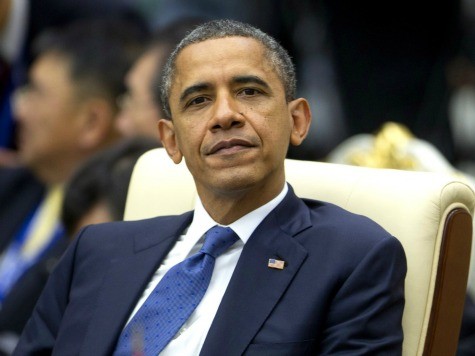
In an op-ed in the Washington Post Wednesday, George Will made the argument that President Obama’s “grandiose claims” for his “presidential power are inversely proportional to his shriveling presidency.”
With a complicit media enabling him by failing to ask tough questions, Will observes that Obama’s presidency is marked by a “pantry of excuses for failure,” a “nonexistent domestic agenda,” a “foreign policy of empty rhetorical deadlines and red lines,” and, most recently on display, an offering of “inconvenience as a justification for illegality.”
Will was referring to Obama’s news conference last week, in which he explained his decision to unilaterally amend a law – his signature health reform law – with the statement, “I didn’t simply choose to” delay the employer mandate “on my own,” but in “consultation with businesses around the country… concerned about the operational details of changing their HR operations.”
According to Obama, as Will observes, there were some “better ways” to “tweak” the law, but due to a situation that the president described as “not in a normal atmosphere around here when it comes to ObamaCare,” it was apparently okay to say, “We did have the executive authority to do so, and we did so.”
Will notes, of course, that not one journalist asked, “Where does the Constitution confer upon presidents the ‘executive authority’ to ignore the separation of powers by revising laws?” The correct answer is “Nowhere.”
In addition, the Constitution does not provide for joint changes to federal laws by the executive branch and “businesses.” One might think a Constitutional law professor-turned president might know that.
But Obama has amended his signature legislation more than several times now. As Avik Roy has noted in Forbes:
First, there was the delay of Obamacare’s Medicare cuts until after the election. Then there was the delay of the law’s employer mandate. Then there was the announcement, buried in the Federal Register, that the administration would delay enforcement of a number of key eligibility requirements for the law’s health insurance subsidies, relying on the “honor system” instead. Now comes word that another costly provision of the health law–its caps on out-of-pocket insurance costs–will be delayed for one more year.
Not to mention the waivers to unions and other businesses, the fact that the administration has missed as many as one-third of the deadlines that are specified by the law itself, and the recent announcement that members of Congress and their staffs will have a special “fix” to the law so that their premiums won’t soar like they will for Americans who are less than elite.
As Politico described the White House’s urgency to make the “fix” for members of Congress:
There was a certain sense of urgency, too, since enrollment in the exchanges was set to begin Oct. 1. There were discussions of a legislative fix — attaching language to a must-pass bill to fix the problem. But that would’ve been too difficult in today’s paralyzed Washington.
White House officials acknowledged that a fix was needed. But they knew that once they dealt with it through a regulation, some Republicans would use it against them – even though most of their party was privately obsessing over it.
Charles Krauthammer, like Will, is not convinced that Obama is merely acting as a pragmatic handy man as he “fixes” laws here and “tweaks” them there. In the Washington Post, he asks, “Can Obama Write His Own Laws?” Krauthammer writes:
Such gross executive usurpation disdains the Constitution. It mocks the separation of powers. And most consequentially, it introduces a fatal instability into law itself. If the law is not what is plainly written, but is whatever the president and his agents decide, what’s left of the law?
The problem is not just uncertain enforcement but the undermining of the very creation of new law. What’s the point of the whole legislative process — of crafting various provisions through give-and-take negotiation — if you cannot rely on the fixity of the final product, on the assurance that the provisions bargained for by both sides will be carried out?
But what is the perception of Americans? Obama’s handling of dismissing the Constitution and making his own laws is to distance himself from the illegality of his actions. In his appeal to the uninformed masses – the very target of leftist populists – Obama says, “So where I can act on my own, I’m going to. I’m not going to wait for Congress.”
Of course, as many Americans have discovered, just about “everywhere” is where Obama believes he can act on his own.
What Obama has done is made lawlessness popular. He has made illegality “cool,” and he has made contempt for the Constitution an example of what is practical and what is simply a no-nonsense means to get around government “red tape.” His message is undoubtedly to “fundamentally transform” Americans’ perception of the Constitution: Our founding document is nothing more than government “red tape.”
And who among Americans does not hate government “red tape?” Despite the fact that liberal policies create much of the “red tape,” the left complains about it just as much as those on the right, when they have to deal with it. But Obama has turned his lawlessness into a pragmatic necessity that is “okay” because Congress is dysfunctional due to the conservative House Republicans. His manipulation of ill-informed Americans has been a classic example of Alinsky principles.
If we ask the question, “When is a law not a law?” The answer, apparently, is, “When Barack Obama is president.”

COMMENTS
Please let us know if you're having issues with commenting.